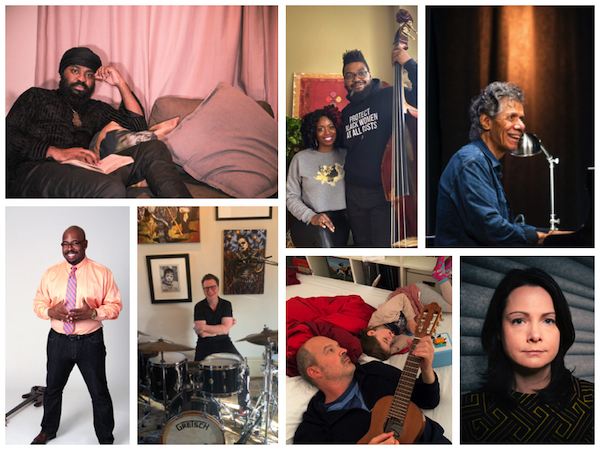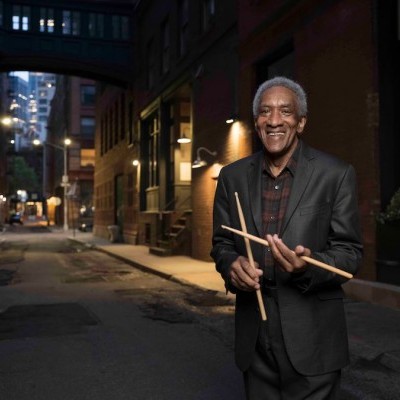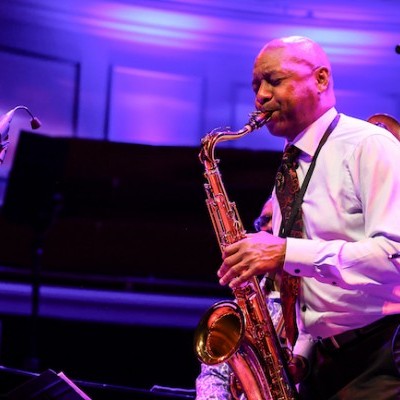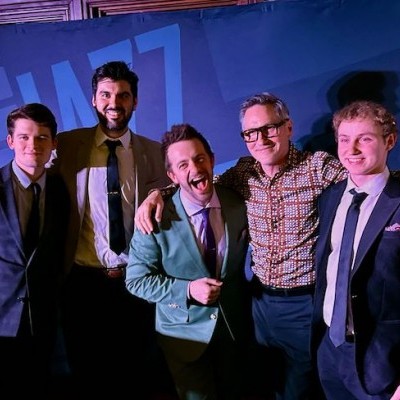Jun 3, 2025 11:25 AM
In Memoriam: Al Foster, 1943–2025
Al Foster, a drummer regarded for his fluency across the bebop, post-bop and funk/fusion lineages of jazz, died May 28…

Top row from left: Nduduzo Makhathini (Photo: Nailah Makhathini); Brandee Younger and Dezron Douglas at their home in the East Harlem neighborhood of New York City (Photo: Courtesy of Artists); Chick Corea (Photo: Toshi Sakurai, Courtesy Chick Corea Productions). Bottom row from left: Christian McBride (Photo: R. Andrew Lepley); Stanton Moore at his home in New Orleans (Photo: Lauren Del Rio); Wolfgang Muthspiel and his 4-year-old daughter, Flora, at their home in Vienna (Photo: Courtesy of Artist); Kris Davis (Photo: ©Caroline Mardok).
(Photo: DownBeat Collage)It wasn’t supposed to be like this. Musicians around the globe had gigs, recording dates, mixing sessions—stuff to do. But now, performers are stuck at home.
The coronavirus pandemic has forced artists to rearrange their lives and livelihoods, but it hasn’t stifled creativity. Harpist Brandee Younger and bassist Dezron Douglas have responded to the crisis by offering up brunch-time concerts, livestreamed from their East Harlem apartment.
“I have to be honest: I didn’t think it would impact others at all,” Younger said about their late-morning sets. “We look at doctors, we look at EMTs—they’re saving people’s lives every day. Cops, they’re putting their lives on the line. We’re playing music, and I sometimes feel silly, thinking about—not to say our job is nonessential—but I didn’t really understand the intangible impact that it has on people—versus a job where you’re actually fixing something or fixing a person.”
The unemployment rate approached 14 percent in May as the United States wrestled with strategies to mitigate economic damage while balancing it with the human toll of the pandemic. It’d be generous to say that the response from the federal government has been diffuse and, at such a large scale, problematic at times. On May 12, congressional Democrats unveiled what they dubbed the “Heroes Act,” a $3 trillion coronavirus relief package that would bolster unemployment benefits, generate a second round of stimulus checks and allocate funds for state, local, territorial and tribal governments. Pundits predict it will be “dead on arrival” when it reaches the Senate.
Other piecemeal efforts to quell looming financial issues seem likely to continue, though: Independent fundraising efforts aimed at helping full-time freelancers, musicians and service-industry people have cropped up. And musicians temporarily cooped up in their homes have turned to livestreaming in an attempt to replace income from canceled gigs and festival dates.
But none of these strategies have staved off the ball of existential dread people have been toting around in their guts since the pandemic began. The jazz world seems especially hard hit.
“Twelve-hundred dollars—that might be someone’s mortgage [payment] in Topeka, Kansas, or Cheyenne, Wyoming, or maybe Richmond, Virginia,” Douglas said during a chat about the stimulus checks the IRS began issuing to U.S. citizen tax payers in April. “But that’s a third of someone’s mortgage in New York City.
“The five boroughs are pretty much built on freelance work. They weren’t prepared for the unemployment of people who are W2ers, let alone the people who are freelancers,” Douglas continued. “That being said, Brandee has been way more diligent about going through the process. And, me personally, it’s something that I get frustrated with real fast, as far as paperwork goes. So, this Monday, I attempted my [New York state unemployment] application and things are going really smooth. And then for some reason, I got locked out and had to start all over again.”
While millions simply are working to maintain a slice of the lives they knew before the pandemic, nearly all the artists DownBeat spoke with shared an anecdote about some surprising kindness visited upon them by a close friend or just a casual acquaintance.
Pianist Kris Davis experienced humanity’s generous side while working from home north of New York during the lockdown—teaching, practicing and tending to label business. Pyroclastic Records, the label she founded in 2016, is on track to maintain its release schedule this year; pianist Cory Smythe’s Accelerate Every Voice is due June 12. But Davis noted that younger performers, those yet to become established on the ruthlessly competitive New York scene, are facing multiple hurdles.

Foster was truly a drummer to the stars, including Miles Davis, Sonny Rollins and Joe Henderson.
Jun 3, 2025 11:25 AM
Al Foster, a drummer regarded for his fluency across the bebop, post-bop and funk/fusion lineages of jazz, died May 28…

“Branford’s playing has steadily improved,” says younger brother Wynton Marsalis. “He’s just gotten more and more serious.”
May 20, 2025 11:58 AM
Branford Marsalis was on the road again. Coffee cup in hand, the saxophonist — sporting a gray hoodie and a look of…

“What did I want more of when I was this age?” Sasha Berliner asks when she’s in her teaching mode.
May 13, 2025 12:39 PM
Part of the jazz vibraphone conversation since her late teens, Sasha Berliner has long come across as a fully formed…

Roscoe Mitchell will receive a Lifetime Achievement award at this year’s Vision Festival.
May 27, 2025 6:21 PM
Arts for Art has announced the full lineup for the 2025 Vision Festival, which will run June 2–7 at Roulette…

Benny Benack III and his quartet took the Midwest Jazz Collective’s route for a test run this spring.
Jun 3, 2025 10:31 AM
The time and labor required to tour is, for many musicians, daunting at best and prohibitive at worst. It’s hardly…